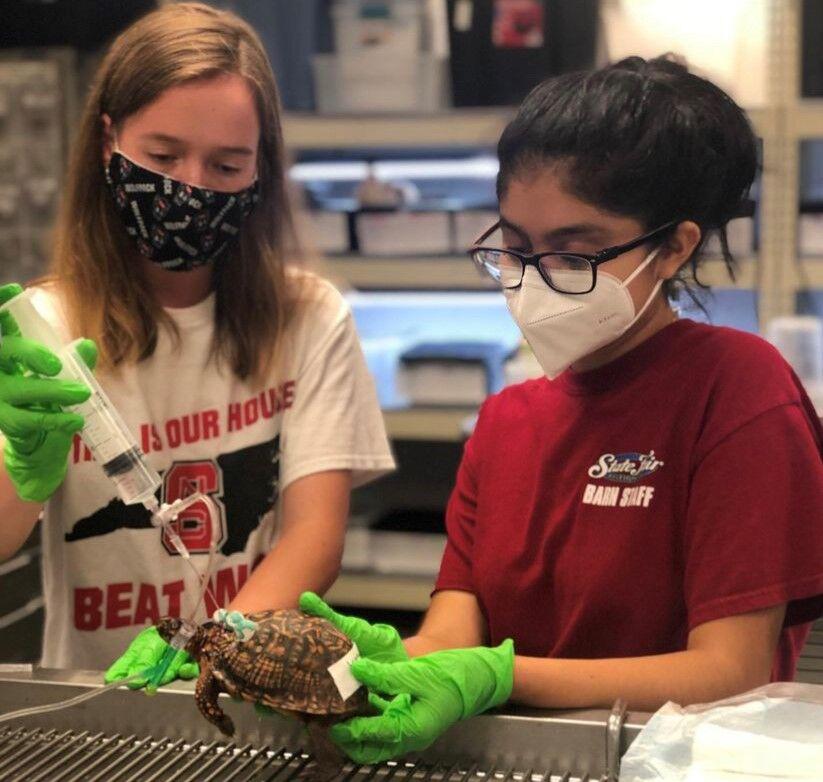Since 1996, NC State’s student-led Turtle Rescue Team has treated and rehabilitated hundreds of wild turtles, reptiles and amphibians each year. With the goal of releasing the turtles back to their native habitats, the organization provides valuable hands-on experience and a community for its volunteers.
Gregory Lewbart, professor of aquatic, wildlife and zoological medicine at the College of Veterinary Medicine (CVM), was new to NC State in 1993 when the first injured turtles were brought to the CVM.
“People would sometimes find a turtle that was hit by a car and bring it to the vet school,” Lewbart said. “Somebody would find me, and I would come in and try to treat it.”
According to Lewbart, because wild turtles are not pets or research animals, there was no designated area for their treatment at the CVM.
“I had to find a place for them in my lab, and we were literally stacking them up in boxes,” Lewbart said. “It was simple: three or four turtles.”
From 1993 to 1996, Lewbart, alongside veterinary students, saw and treated a growing number of turtles. Their efforts culminated in 1996 when a colleague contributed $2,500 to keep operations going. Though meager by today’s standards, the donation was enough to purchase the necessary equipment to set the gears of the Turtle Rescue Team into motion.
Twenty-five years later, the team has occupied five different locations, but students and donations from the community continue to drive the organization, with Lewbart providing aid where needed. Sharing the administrative role with Lewbart, Kent Passingham, a research specialist in zoological medicine, handles paperwork, facilitates research projects, fills prescriptions and manages other duties above the capabilities of volunteers.
On any given normal year, volunteers include high school students, undergraduates and veterinary students. Because of COVID-19, high schoolers are unable to volunteer at this time. Volunteer responsibilities consist of organizing rounds, liaising with specialists, conducting original research projects and training newcomers. Depending on the number of volunteers available, some work up to 50 hours a week.
In addition to providing free medical care, volunteers also organize various public outreach activities and educational programs, such as the Turtle Ally Program, where they train licensed veterinarians in the state to treat wild turtles.
Christian Capobianco, a third-year veterinary student, has been part of the team since he was an undergraduate student in the animal science department.
“I was trying to look for some opportunities to get animal and veterinary experience because so many students need to get X number of hours to be competitive for vet school,” Capobianco said.
After five years of volunteering, Capobianco is now one of three co-presidents of the team. His list of responsibilities include carrying out surgical procedures, liaising between students and faculty, providing assistance to less experienced vet students and ensuring a smooth operation.
Not only does volunteering with the Turtle Team provide an edge on admission to vet school, but it also solidifies skills taught in the classroom for current veterinary students and prepares them for a career beyond the CVM.
“In vet school, sometimes you only get two or three surgeries before you graduate, but here at Turtle Team our case managers graduate with 40 or 50 surgeries on turtles,” Capobianco said.
According to Lewbart, the three most valuable aspects of the team are giving volunteers the knowledge to develop their skills, spreading awareness through community outreach and saving the turtle population in the state.
Capobianco said the public plays a major role in contributing to the population of wild turtles.
“I really do want to thank the public for being so confident in our abilities and taking the time to really care about the native wildlife because it does make a difference,” Capobianco said. “What we do is really inspiring … and we all love being here.”
If students ever find an injured turtle, they can email turtle-rescue-team@ncsu.edu or call 919-397-9675.
To make a donation to the Turtle Rescue Team, payments can be made through the Turtle Rescue Team’s website.













